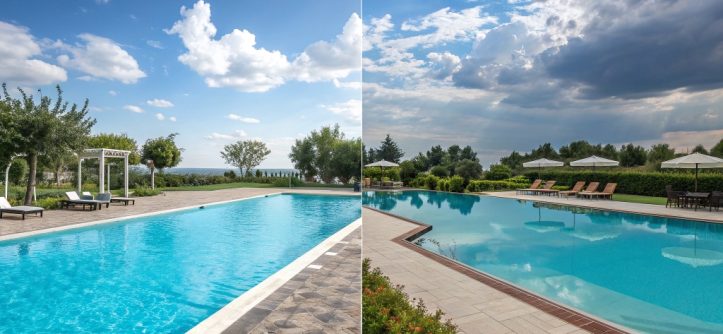Choosing the right pool sanitation system is one of the most important decisions for any pool owner. Saltwater and chlorine pools both effectively maintain clean, safe swimming water, but they do so in very different ways. Understanding the long-term costs, comfort factors, and safety considerations of each option will help make the best choice for a backyard oasis that fits lifestyle and budget needs.
This guide offers an in-depth comparison of saltwater and chlorine pools in 2025, highlighting key pros and cons to inform smart pool ownership. It also highlights how the best-rated saltwater pool systems bring innovation and ease to saltwater maintenance.
How Saltwater and Chlorine Pools Work
Saltwater pools utilize a salt chlorine generator that converts dissolved salt into chlorine through an electrolysis process. The chlorine sanitizer is produced continuously, maintaining a stabilized level in the pool water without the need for frequent manual chemical additions. Chlorine pools require the regular addition of chlorine tablets, liquid, or granules to sanitize and keep water free from bacteria, algae, and other contaminants. Chlorine levels and pool chemistry must be monitored and adjusted more frequently compared to saltwater systems.
Cost Considerations Over Time
While saltwater pools often come with a higher upfront installation cost due to the purchase and setup of the salt chlorine generator, they tend to feature lower long-term chemical and maintenance expenses. Saltwater systems reduce the need to purchase chlorine products regularly, resulting in gradual savings.
Traditional chlorine pools typically cost less initially but can accumulate higher ongoing chemical and maintenance costs because pool owners manually dose chlorine multiple times per week and conduct frequent water testing.
Repair expenses may be higher for saltwater pools, as specialized equipment like chlorine generators requires expert servicing. Chlorine pool components are usually simpler and more widely available, making repairs easier and often less costly.
Comfort and Swimming Experience
Saltwater pools are celebrated for their softer, silkier water feel. The lower chlorine levels reduce everyday irritations such as dry skin, red eyes, and the strong chlorine smell associated with traditional pools. This gentler environment benefits swimmers with sensitive skin, allergies, or those who wear contact lenses.
Conversely, chlorine pools maintain water cleanliness effectively but may cause dryness or irritation due to higher chlorine concentrations and fluctuating chemical balances. The distinct chemical odor of chlorine pools may be unpleasant to some swimmers.
Safety and Environmental Impact
Saltwater pools produce fewer chloramines — the harsh compounds often responsible for the “chlorine smell” and irritations. They also eliminate the safety risks associated with storing and handling chlorine chemicals, which can be toxic or hazardous if mishandled in chlorine pools.
Salt systems carry the risk of corrosion to pool fixtures and nearby surfaces because of the salt content, especially if not properly maintained. Chlorine pools avoid this issue but require careful chemical storage and handling protocols.
Both pool types consume electricity primarily through pump operation and filtration. Salt chlorine generators do add a small additional power draw, usually making saltwater pools slightly more energy-intensive.
Maintenance Requirements
Saltwater pools require regular monitoring of salt levels and the proper functioning of the chlorine generator. While chemically simpler to maintain day-to-day, saltwater systems demand periodic equipment cleaning and may encounter issues with scaling or corrosion.
Chlorine pools rely on more frequent water testing and chemical balancing to maintain water safety and clarity. Owners must add chlorine regularly and monitor pH and alkalinity levels to prevent algae growth and bacterial contamination.
Which is Right for You?
The best choice depends on personal preferences, budget, and maintenance willingness:
- If comfort, a softer water feel, and reduced chemical handling are priorities, investing in a saltwater pool may pay off in long-term satisfaction.
- For those with a tighter initial budget who prefer straightforward repairs and avoid dealing with salt corrosion, traditional chlorine pools remain a reliable and practical choice.
By weighing cost factors, comfort preferences, and safety concerns, pool owners in 2025 can select the system best aligned with their lifestyle. Regular maintenance, water testing, and equipment care will keep any pool sparkling and inviting season after season.
Invest wisely today to enjoy your backyard retreat for years to come with water that’s clean, comfortable, and safe for family and friends.




